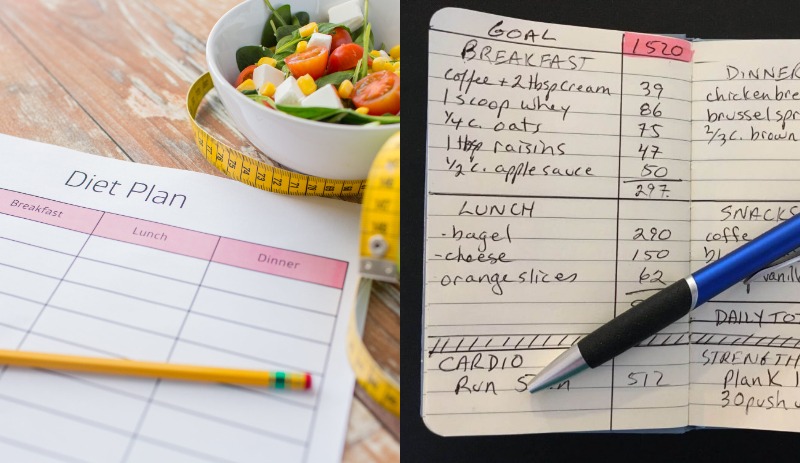Tracking today will pave the way for tomorrow’s victory. When it comes to weight loss, keeping a food diary is an effective tool to track your progress. Everything you write in your food diary will help you reach your weight loss goals. A food diary not only records your daily food intake, but also your physical activity, emotions, and eating habits. When used in the right way, it can guide you towards your weight loss goals. In fact, keeping a food diary and reviewing it at the end of each week can help you understand what you’re eating, how much you’re eating, and keep track of where your extra calories are coming from. It helps you eliminate foods that hinder weight loss and make room for foods that actually help you lose weight. In fact, in one study, people who practiced food self-monitoring were able to reduce their food intake, which led to subsequent weight loss. This article lists more reasons why keeping a food diary can help you lose weight.

5 reasons to start your weight loss journey with a food diary:
1. Keeping a diary of what goes on your plate can help you track and cut out sources of extra calories from your daily diet.
2. Tracking your calories will create a calorie deficit, which will ultimately help you lose weight.

3. A food diary can help you identify and eliminate sugary and calorie-dense foods, which are thought to be the main cause of weight gain.
4. Helps you self-monitor your progress in both dietary intake and physical activity. It also tracks your eating habits, eating patterns, and emotional factors that lead to overeating or binge eating. Also read 8 Small Steps to Start Your Weight Loss Journey Today.
5. A food diary provides insight to nutritionists and weight loss program teams to determine which foods and techniques are effective and what dietary pattern changes and lifestyle modifications are needed to promote weight loss. useful for evaluating.
Food diary prompt: Important details to record in your food diary entry:
1. Write down everything you eat throughout the day. Don’t forget to prepare snacks in addition to your main meal. You should also write down the serving size. How much did you eat? Did you have any refills?
2. Also mention timing. Instead of eating at irregular times, try to have consistent meal and snack timings.
3. Write down the measurements of the main materials used. Measure your ingredients before cooking and record all measurements in your diary. If you have not been able to lose weight in a particular week, it is very easy to lose weight by reviewing your measurements for that week.
4. If you eat outside of your diet, write down your feelings about why and whether you gave in to your appetite. Were you tired, bored, or did you just eat food to overcome stress or calm your agitated nerves?
5. Did you eat because you were very hungry?
6. Did you have a craving for any particular food that day? Did you give in to the craving or fight the temptation?
7. Did you cheat on your diet? Did you order food from outside? Did you eat too much?
8. Don’t forget to include whether you were physically active that day, how many steps you took, any workouts you did, and how many minutes you walked.
9. Mention water intake. Did you consume at least 8 glasses of water?
10. Did you sleep well the night before? Sleep habits should also be mentioned, as lack of sleep has a big impact on appetite and cravings. Lack of sleep can increase your appetite the next day and make you want to eat high-calorie foods. Also read: 8 Surprising Empty Calorie Sources You May Be Overlooking.
6 tips to get the most out of your food diary:
1. Write down all details. There’s no need to be embarrassed about what a nutritionist thinks. For better results, you should write down every bite.
2. Enter your details as soon as you eat your meal. Don’t wait until the evening as you may miss some details.
3. Write down your protein, carbohydrate, and healthy fat intake. Did you get enough vitamins and minerals from your diet? Where do these macro and micronutrients come from?
4. Did you meet your recommended intake of vegetables and fruits for the day?
5. Reread your diary every week, record how many times you eat junk food, and resolve to eliminate that food the following week.
6. Don’t forget to review your food diary after stepping on the scale at the end of the week. If you’ve lost weight, find out what worked for you. If you’ve gained weight, find out what went wrong.
In conclusion, the simple act of keeping a food diary is a very powerful strategy in your weight loss journey. Not only is it important to keep a food diary, but it’s also important to review this diary at the end of each week to gain important insights into your eating habits and calorie intake. If maintained correctly, this food diary can serve as a roadmap to achieving your weight loss goals. Check out the Rati Beauty Diet diet plan to shed all those extra pounds and reduce your waist by a few inches. Subscribe to Rati Beauty Diet to access weight loss diet plans.
8 small steps to start your weight loss journey now
8 surprising sources of empty calories you may be overlooking


